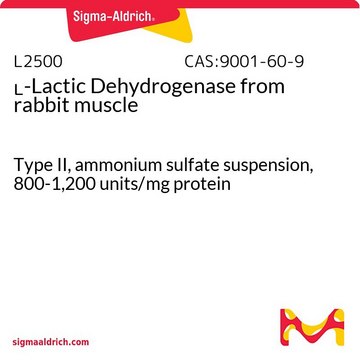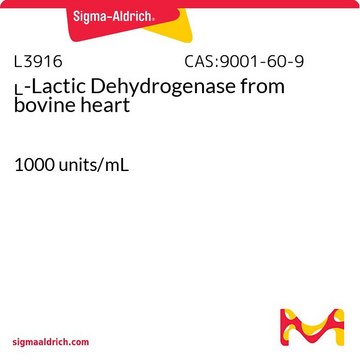L2625
L-Lactic Dehydrogenase from bovine heart
Type III, ammonium sulfate suspension, ≥500 units/mg protein
Synonym(s):
Lactate, (S)-Lactate: NAD+ oxidoreductase, L-LDH, LAD, LD
About This Item
Recommended Products
type
Type III
Quality Level
form
ammonium sulfate suspension
specific activity
≥500 units/mg protein
foreign activity
pyruvate kinase ≤0.03%
storage temp.
2-8°C
Gene Information
cow ... LDHA(281274) , LDHB(281275)
Looking for similar products? Visit Product Comparison Guide
General description
Lactate dehydrogenase (LDH) is a cytoplasmic enzyme that belongs to the oxidoreductase’s family. It is ubiquitously expressed in body tissues but at high levels in muscle, liver, and kidney. LDH exists as tetramer and comprises of two subunits (H and M). The LDH of eukaryotes undergo active-site loop gating for their catalytic functionality. L-lactate, which is the major enantiomeric form of lactate in vertebrates, is produced by the L-isomers of LDH enzyme encoded by the LDHC gene.
Application
Biochem/physiol Actions
Unit Definition
Physical form
Analysis Note
Signal Word
Danger
Hazard Statements
Precautionary Statements
Hazard Classifications
Resp. Sens. 1
Storage Class Code
10 - Combustible liquids
WGK
WGK 1
Personal Protective Equipment
Certificates of Analysis (COA)
Search for Certificates of Analysis (COA) by entering the products Lot/Batch Number. Lot and Batch Numbers can be found on a product’s label following the words ‘Lot’ or ‘Batch’.
Already Own This Product?
Find documentation for the products that you have recently purchased in the Document Library.
Customers Also Viewed
Articles
Instructions for working with enzymes supplied as ammonium sulfate suspensions
Protocols
Enzymatic Assay of L-Lactic Dehydrogenase (EC 1.1.1.27)
Our team of scientists has experience in all areas of research including Life Science, Material Science, Chemical Synthesis, Chromatography, Analytical and many others.
Contact Technical Service












